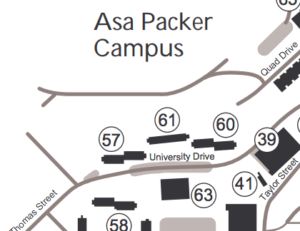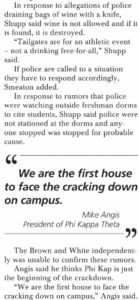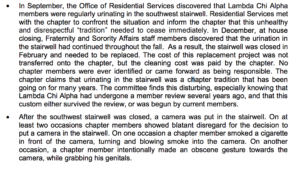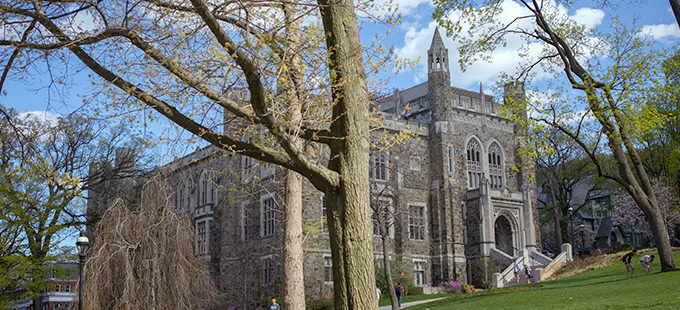Disclosure: I may earn affiliate revenue or commissions if you purchase products from links on my website. The prospect of compensation does not influence what I write about or how my posts are structured. The vast majority of articles on my website do not contain any affiliate links.
I graduated from Lehigh University in 2016. I was a member of a fraternity there and currently serve on that organization’s advisory board. For as long as I can remember, I’ve been obsessed with fraternities and secret societies. I think that it would be a shame for the rich history of Greek life at Lehigh to fade into obscurity, so I’ve compiled this blog post.
While my aim has been to capture the relevant, interesting, and historically-significant events from the last 150 years, the narrative I’ve been able to piece together from newspapers, school bulletins, my own undergraduate experience, and private alumni submissions is overwhelmingly negative. The newsworthy items that have actually been preserved, in aggregate, reflect poorly on Lehigh’s Greek scene, Lehigh’s Office of Fraternity and Sorority Affairs, and Lehigh’s administration.
This “history” is not something that should be consumed by an outsider–especially a prospective student–to reach conclusions regarding Lehigh University. Broadly, the purpose is to contextualize the current state of affairs at Lehigh and at other schools also suffering through a period of turbulence.
Chronological History
1872: First social fraternity, Chi Phi, is founded at Lehigh. More founding dates.
1908: Lehigh’s Board of Trustees allows fraternities to build their chapter houses at Sayre Park, also known as “the Hill.” Before this, most fraternities occupied/owned houses in South Bethlehem. Some of these were purchased by Lehigh and converted into administrative buildings. The houses still standing can be found on the 200 block of West Packard Ave.
(Author’s note: The only source for early-20th-century South Bethlehem fraternity house information tends to be historical pamphlets published by each individual fraternity (or national organization) at milestone anniversaries. If you are in possession of one, please share it.)
1928: Max McConn, the first Dean of Students at Lehigh University, publishes his book College or Kindergarten? I view his as the first meaningful critique of Greek Life at Lehigh. Sadly, the book is out of print, though it is quoted extensively in studies of the time period, especially of “elite” private schools. If you want to locate a copy of the book for research purposes, use this link.
Max McConn, Dean of Lehigh University, noted, “If a lad has an agreeable exterior, a winning smile, and a pleasing manner, if he is a ‘slick dresser’ and a ‘smooth talker’ and he is duly accredited as to purse, progenitors, and preparatory school, he is sure to be taken. Nay if his ‘slickness’ and ‘smoothness’ are exactly right, he will get in despite serious deficiencies in one or more of the other items.
Next sentence–not authored by Max McConn
The criteria of acceptability for most fraternities were attributes of manner, dress, and style. These were certainly related to family background, economic position, and prep-school training, but they could also be cultivated.
(Author’s note: These quotes are from The Company He Keeps, one of the few books providing a somewhat-unbiased modern study of Greek Life)
Fall 1971: Lehigh enrolls women (though one was accidentally admitted in 1937 due to confusion over her name being Jean).
September 1973: Mitchell Fishkin, a Delta Phi pledge, dies after jumping out of a moving car during a hazing ritual. There was a $21,000,000 lawsuit. Officially, the school called the incident the unfortunate result of a “prank” and “horseplay.” However, the lawsuit alleged that Fishkin was in fact thrown out of the automobile while bound with rope. The fraternity remained on campus with no reported sanctions. The trial did not start until April 1977 and the final ruling was apparently that the death was accidental.
1974: “Three homosexual members of Theta Chi fraternity voluntarily moved out of the fraternity in line with alumni recommendation.”
Tau Delta Phi voluntarily closes, remaining members merge with Zeta Psi. Tau Delta Phi does not return to campus.
November 1975: First campus sorority is founded: Alpha Phi.
July 1978: Animal House movie is released, loosely depicting a Dartmouth fraternity. Mainstream treatment of Greek Life, to the present day, is largely based on this movie.
Early 1980s: Lehigh fraternity men are credited with inventing the modern variant of beer pong, likely having named it “Beirut” due to civil unrest in Lebanon.
1981: Delta Tau Delta is suspended for four years and their house is converted to a dormitory, though it eventually returns to Delta Tau Delta.
Mid-1980s: The golden age of Greek Life at Lehigh. There are 36 fraternities. Full retrospective article.
Like Dartmouth, Lehigh has a rich Greek tradition. When I attended in the early ‘80s, Lehigh had as many fraternities (36) for an undergraduate population of 4,000 as Penn State had for a community of 20,000. For Lehigh freshman men, the question used to be which house you’d be pledging, not whether. There were fraternities to suit every interest and personality…
We were on tap 24/7.
(Author’s note: I recommend reading the full article linked above. The guy who wrote this op-ed in 2015 had a lot more to say and actually corresponded with Lehigh’s Dean of Students. It is perhaps the only contextualization of Lehigh’s old-versus-new clash that has been formally prepared and preserved.)
May 1985: Delta Sigma Phi is dissolved for kidnapping a pledge. It is not clear whether Delta Sigma Phi ever returned to campus. What is clear is that the times were different.
Delta Sigma Phi members can petition Lehigh’s vice president for student affairs to review Smeaton’s decision, but the fact sheet noted that “there is no provision for formal appeal of this decision.”
MacKinnon said he was not aware that the decision could be reviewed.
He said fraternity members did not feel the March 1 hazing incident, involving freshman pledge Adam Hartwell, warranted dissolution.
“I’d say at least two-thirds of the fraternities kidnap their pledges,” MacKinnon said, “and we just got caught.”
He said the university administration has kept an unusually close watch on the fraternity.
“We’ve never been a favorite of the administration,” he continued.
Late 1980s: The administration begins purchasing fraternity houses from fraternity member associations. This allows the administration to exert significantly more control over the organizations. (source)
(Author’s note: It has been nearly impossible to find records of these transactions or find anything resembling the original agreements struck between the school and the owners of the buildings. Likewise, it has been difficult to find original fraternity house construction dates.)
Late 1980s (estimate): Lehigh bans kegs from campus. A prevalent rumor is that fraternities were causing damage by rolling them down the hill, but I was unable to in any way verify this claim.
1989: “Sigma Chi disbanded until 1993 for violating two sections of the University Code of Conduct.” Sigma Chi does return to campus.
1991: “Sigma Phi Epsilon fraternity was removed from campus for unsatisfactory academic performance. They can reclaim house in 1995.” Sigma Phi Epsilon does return to campus.
Peter Floriani publishes a history of Lehigh’s Beta Pi chapter of Beta Theta Pi to commemorate the chapter’s 100th anniversary. Unfortunately, it does not appear that this book was ever digitized.
May 1991: Sigma Alpha Mu suspended for hazing violation until fall 1993. The fraternity does return to campus in 1993 and reclaims the house (presumably in 1994). In the meantime, it is utilized as a residence hall.
Late 1991: Tau Epsilon Pi is closed by national headquarters due to membership and financial problems. A New York Times article in April 1991 suggests the fraternity is turning things around. Tau Epsilon Pi does not return to campus.
The pledges will now be called associate brothers and will not go through hazing, Mr. Harap said. And the house jobs will be shared equally among the members, he said.
“We are not going to survive if we do not do something,” Mr. Harap said. “We need to present a focus to non-Greeks and freshmen so that they will want to join our house and be a part of something really good.”
1992: “Theta Delta Chi fraternity suspended for four years for hazing pledges.” Theta Delta Chi does return to campus.
1992: Alpha Epsilon Pi, a traditionally-Jewish fraternity, closes due to insufficient membership.
1994: Though there is not a specific incident to corroborate my claim, this year roughly begins the period during which fraternities and sororities became more scrutinized nationally, effectively ending the golden age of the 1980s.
1995: Pi Lambda Phi is closed by national headquarters for membership and financial reasons. The house is awarded to the Alpha Phi sorority in 1996. Pi Lambda Phi does not return to campus.
1996: Lehigh University Board of Trustees announces that sororities will move onto “the Hill” as fraternity houses are vacated. Though seen as a positive move allowing for larger sorority membership, this does give rise to conspiracy theories surrounding unfair practices employed to remove certain fraternities.
“Lehigh was among six schools chosen to participate in “A Matter of Degree,” or AMOD — a program to change deeply embedded beliefs that college and cocktails go hand in hand — and receive a five-year, $821,000 grant from the Robert Wood Johnson Foundation.” (via Morning Call)
Delta Zeta sorority is disbanded after 7 years. The sorority is closed by national headquarters for low membership (source).
1997: Sigma Phi fraternity removed from Lehigh’s campus by alumni due to lack of members. Note that this fraternity is just “Sigma Phi” and has no relation to Sigma Phi Epsilon or Delta Sigma Phi. As of the current day, Sigma Phi only has 9 chapters across the country, though this includes the longest continuously-operating fraternity chapter in the country at Union College. Sigma Phi does not return to campus.
“Lehigh shuts down Delta Chi for failing to meet the university’s minimum standards two years in a row.” Delta Chi does return to campus.
Fall 1999: Administration enacts harsh policies, first ideated in 1996, to curb drinking. Within a few years, these policies effectively end the post-golden era. This is the point at which Greek Life began to fragment, as, for the first time, there were established punishments. School spirit erodes significantly, never to recover. However, parties still mainly occurred on the Hill for the better part of the next decade.
At Lehigh, 68.9 percent of students said they binge drink, defined as consuming five drinks in a row for men and four drinks for women.
Saying the new drinking policies force them to use drugs and sap the campus of its spirit, Lehigh students signed a petition demanding revisions to Project IMPACT and a meeting with administrators.
Several writers indicated they were using the drug Ecstasy and cocaine since the alcohol supply has been cut off.
1999: Fittingly, Lehigh is ranked #1 in the country for “lots of beer” by the Princeton Review. (Morning Call retrospective)
2000: Zeta Psi is dissolved for having a keg of beer in house while on probation. Initial report incorrectly states that the fraternity is the first in eight years to be dissolved and the first ever for alcohol violations. While Zeta Psi was indeed the first fraternity to be kicked off for alcohol violations, Pi Lambda Phi was closed five years prior and Delta Chi was closed just three years prior.
Zeta Psi fraternity brother Ben Edwards made a disparaging remark about Lehigh and said, “This is why alumni don’t give money. I’m not going to give money after I graduate.”
“This school is the only one in the universe where somebody over 21 can’t drink alcohol in the privacy of their own room,” said Jeremy Corkill, 22, a senior and Zeta Psi brother.
This marked the first time that Lehigh’s endowment was brought up in an article about a fraternity getting kicked off. By the year 2000, it was clear that Lehigh’s endowment and alumni giving was severely lagging behind similar institutions and had been gapped by Ivy League schools.
To this day, Lehigh’s alumni giving is abysmal, and many speculate that the school’s tenuous relationship with Greek organizations has exacerbated the issue.
While a later article remarks that this was just a four-year ban, Zeta Psi never returns to Lehigh’s campus. Lehigh’s record lists the dissolution year as 1999, which is inconsistent with the above news article.
Pi Kappa Alpha is suspended for a disciplinary violation. It is not clear what the violation was, where their house was, or what is meant by “suspension” in this context. Since the fraternity is not in the 2002 campus map, I assume the chapter was dissolved and the house repurposed.
Late 2001: Phi Delta Theta fraternity is removed by the national organization. Damage caused to the house around the time of move-out is estimated to be $10,000. Members are charged. Delta Gamma reportedly moves into the house in Fall 2002.
February 2002: A campus map shows that, aside from Alpha Phi in building 98, Gamma Phi Beta in building 100, and Alpha Gamma Delta in #95, the other 6 sororities on campus are still located in the Upper Centennial dorm complex and not on the Hill. Every house on the Hill is occupied. This point could be considered the peak of Lehigh’s post-golden age period, as things were becoming much more restricted but still Greek Life was ubiquitous.
Building 57: Pi Beta Phi, Alpha Chi Omega
Building 61: Chi Omega, Alpha Omicron Pi
Building 60: Kappa Alpha Theta, Delta Gamma

Of note, Alpha Chi Rho occupied building 93, which became the Alpha Chi Omega house. Alpha Sigma Pi occupied building 106, which became the Kappa Alpha Theta house. Delta Sigma Pi occupied an off-campus house on the corner of Birkel and Packer, which today is deemed the “Packer House” which is a “graduate student center.” Building 94, which now houses Zeta Tau Alpha, was occupied by Sigma Alpha Mu. Building 82, which housed Delta Gamma, then housed Kappa Delta, and was razed in 2018, housed Sigma Nu. House 101 housed Phi Delta Theta, which is now the Umoja residence (a space for multicultural groups). House 83 contained Beta Theta Pi, now Pi Beta Phi (no relation). House 107, now Alpha Omicron Pi, housed Theta Delta Chi.
October 2002: Lehigh University is named #23 on Playboy’s “real” party school list. This ranking, and ensuing article from The Morning Call, provides the framework for the idealistic Lehigh at the turn of the millennium. It is worth mentioning that there was only ever one other Playboy list, in 1987, and, though rumored, Lehigh was not featured on it. When people mention the “Playboy Ranking,” they are likely referring to 2002.
“Our motto is, “Work hard, play hard,”‘ junior Amanda Brodbeck said. “Academically, it’s challenging, but it’s also really fun.”
According to Playboy, a student identified only as “Michael” wrote: “Lehigh parties every night. There are never breaks. After the normal party ends, another begins and lasts until morning.”
Another, named “Deborrah,” wrote: “People think that a school of our academic caliber would be full of dorks who sit in their rooms all day doing equations. It’s the complete opposite.”
Fall 2002: Consulting firm NPower is hired to spend “a year” assessing Lehigh’s Greek Life system. Other reports frame this number as “six months.” The firm appears to have no digital record whatsoever. President Farrington provides comment:
“Lehigh, like many universities and colleges, has a long Greek tradition, and in recent years, particularly the past five to 10 years, we’ve seen less and less student interest in Greek life,” said President Gregory Farrington. He said he hopes more alumni and faculty involvement in the fraternity system will fix some problems.
“Students need positive role models to learn leadership and what Greek life is all about. When done well, fraternities and sororities can make positive contributions to Greek life,” he said.
After receiving the report (roughly one month later), Farrington provided further comment:
After spending six months analyzing Lehigh’s system, Npower, an Indianapolis-based consulting firm, issued a 32-page report detailing problems, most of which college officials already knew existed. The consultant’s report, released Monday, includes 10 “key recommendations” for resolving those problems. None is particularly revolutionary.
“I wished that the recommendations had been more specific and energetic,” Lehigh University President Gregory Farrington said.
“College officials would not say how much they spent for Npower’s services.”
2004-2005 School year: Lehigh Introduces the accreditation process which aims to be a comprehensive annual review of five categories deemed vital for the Greek community success: Intellectual Development, Leadership Development, Community Development, Organizational Development, and Facilities Management.
2005: Chi Omega sorority disbanded. Alpha Phi Sigma fraternity disbanded.
2006: US News & World Report covers Lehigh’s initiatives to curb binge drinking and excessive partying.
Lehigh is one of many colleges putting a damper on wild, Animal House-style bashes. Prompted in part by dozens of alcohol-related student deaths in recent years, schools are bypassing educational campaigns of the “Just Say No” variety and taking concrete steps to change the culture of drinking on campus. Some are banning alcohol entirely; others are drying out aspects of student life, such as fraternities and athletic events, or cracking down on underage drinkers. “It’s not about trying to stop students one drink at a time,” says John Smeaton, vice provost for student affairs at Lehigh in Pennsylvania. “We’re looking at this as a complete cultural change.” The university is one of 10 well-known party schools involved in a new $10 million national initiative, managed by the American Medical Association, to reduce binge drinking on campus.
June 2006: Unrelated NYT report on a Lehigh bank robber reveals that fraternities have taken to posting “sentinels” outside of their dwellings to watch out for police raids. It is notable that, until Beta Theta Pi in 2008, no Greek organizations are kicked off campus for a two-year period starting in 2006.
August 2006: Alice Gast becomes Lehigh’s 13th President.
November 2006: Lehigh police enter Phi Kappa Theta fraternity house without probable cause and cite 41 students. This was seen as the first step of a larger crackdown by the administration and police force. This is pretty much the beginning of the “modern era.” Parties start moving off the Hill to off-campus apartments.

March 2008: Beta Theta Pi is kicked off jointly by its national organization and Lehigh. The fraternity is not allowed to re-apply for a charter until 2018. Pi Beta Phi is awarded the house. Beta Theta Pi does not return to campus.
The sanction follows an incident at the fraternity house last month in which one student had a blood alcohol level the campus police chief said was the highest he has seen in a person who survived.
As recently as last fall, campus and city police teamed up to conduct sweeps on university parties, including one weekend last September when 26 students were arrested for underage drinking.
March 2008: In the same week, Sigma Alpha Mu is kicked off and receives a ten-year ban from campus housing because pledges were found to be “significantly” intoxicated. Brothers are allowed to remain in the house until the end of the school year. Eventually, their house is occupied by Zeta Tau Alpha.
This violation is not reported by student newspaper when “Sammy” applies to return to campus in 2014. This is the 13th fraternity removed from Lehigh since 1990. (Morning Call)
“The students I met with are not your typical animal-house fraternity type,” [Jud Horas, a rep from Sammy’s national headquarters] said. “They wanted the chance to show they could change. Unfortunately, sometimes you don’t get another chance.”
April 2010: Chi Phi, then considered Lehigh’s top social fraternity, dismisses all active members in exchange for getting to keep their house and active charter. Though never officially documented, it is widely accepted that this came as a result of a freshman pledge writing an essay about his experience getting hazed for the prompt “What’s the hardest thing you’ve ever done?”
Rumor has it that his English teacher was on the anti-hazing counsel at Lehigh and immediately reported the paper, resulting in an investigation.
March 2011: Delta Tau Delta is kicked off for hazing, among other things. Delta Tau Delta does not return to campus, and Pi Kappa Alpha, a recognized group operating off-campus, is awarded the house in Fall 2012.
According to the evaluation report, violations included hosting unregistered social events and fighting with another fraternity. Members also cut down a tree on university property, brought it into their home and tried to burn it in the fireplace, the report states.
August 2011: Lehigh named 7th best Fraternity/Sorority Scene by The Princeton Review (via TFM).
March 2012: Men’s Basketball team beats Duke in March Madness. A riot erupts on campus and a tree is burned down. Lehigh gains additional attention for a fan with a funny sign.

Fall 2012: Lehigh announces “Lehigh After Dark” program which is meant to provide alternative nightlife activities for those who do not wish to participate in “high-risk drinking behaviors.” This program includes weekly trivia and 1-3 monthly events such as (what I could uncover at the time of writing) “Spa Night,” “Open Mic Night,” and “Sex in the Dark.”
During this time, Lehigh instructs undergraduate tour guides to lie about the prevalence of Greek Life. Each tour guide, after being thoroughly vetted as someone who won’t go off script, is ordered to tell prospective students that there are other meaningful social events on campus, such as Lehigh After Dark events and the one concert each semester.
2013: Princeton Review ranks Lehigh as having the #2 worst Town-Gown Relation in the country.
(Author’s note: I always found it interesting that Lehigh’s administration never publically acknowledged this. From this point forward, during freshman orientation, they did make a point to tell students not to refer to Bethlehem locals as “townies.”)
Spring Semester 2013: It was my experience that, by this semester, the majority of parties were occurring in cramped off-campus apartments instead of the grand fraternity houses on the Hill. The risks were simply too great. Though there are still isolated incidents through the 2013 spring semester, the police eventually stop “raids” and shift their manpower to busting off-campus parties.
February 2013: Delta Gamma sorority is disbanded by their national organization following a comprehensive 60-day membership review by their national organization. Though Lehigh’s administration didn’t ultimately pull the trigger, the sorority being in “some type of trouble for the last nine years” was a direct result of the school’s policies.
The school was criticized for never officially informing the sorority’s chef that she would be losing her job in two weeks. It is worth mentioning that the sisters of the sorority were allowed to continue living in the house for the rest of the semester while the chef was forcibly relieved from her duties.
This was the only disbandment of the modern era that did not result in a post to the Lehigh Greeks blog, though the start of the membership review period was announced in December 2012.
June 2013: FIJI Fraternity is disbanded by Lehigh administration for getting poor marks on accreditation. Rumored to have the alumni base with the deepest pockets (which is saying something at a school like Lehigh), the Greek organization is the only one to get kicked off and not have had its house (building 104) repurposed. Non-affiliated members have been allowed to live there, but the building has been passed over for long-term group housing.
One theory is that the alumni are influential enough to have organized a backroom deal with the school in order to facilitate a return after the mandatory 5-year cooling off period. In the past, fraternities were guaranteed to get their houses back. At the 2014 Lehigh-Lafayette game, an alumnus flew a private plane over Goodman Field with a banner that read “Bring Back FIJI.”
January 2014: Lehigh faces civil rights probe (Morning Call):
The complainant, Susan Magaziner, a 1977 Lehigh University graduate who now lives in Essex, Conn., says the university failed to report vandalism of UMOJA House, a multicultural residence hall, as a hate crime. The student housing was allegedly egged and spray-painted with racial slurs last November.
As a result of the referenced event, there is widespread outrage on campus.
April 2014: Student who vandalized UMOJA house with racial slurs is expelled. He was a member of Sigma Chi (the building immediately across the street from UMOJA) but was found to have acted alone. (Morning Call).
June 2014: Lehigh kicks off Lambda Chi Alpha for flunking accreditation. It was widely speculated that there was more to the story, as the failures noted in the accreditation report seemed somewhat arbitrary. This was not received well by the campus community, as the fraternity and its members were respected. The main grievance was that the fraternity had a tradition of urinating on a stairwell that then needed to be replaced.

(Lambda Chi Alpha’s house was then awarded to Phi Delta Theta in Fall 2015. Phi Delta Theta’s original house on the Hill remained occupied by another student group.)
Lambda became the first fraternity to successfully adapt to Lehigh’s sanctions. The fraternity’s membership was so strong that they went on to recruit a large unofficial pledge class. The school tried to put a stop to it by sending letters about “officially recognized groups” home to freshman parents, but this proved futile. Leaders of the fraternity then arranged to merge with a failing organization that had university housing.
Lehigh continues to maintain a list of “unrecognized groups.”
August 2014: Kevin Clayton, an Alpha Tau Omega alumnus, becomes Lehigh’s interim president.
September 2014: Lehigh resolves civil rights complaint, is not found to not be at fault, and takes voluntary corrective actions.
November 2014: Lehigh begins the selection process for officially recognizing a new Jewish fraternity. Alpha Epsilon Pi has been an “unrecognized campus group” “since 2001.”
Tim Wilkinson, senior assistant dean of students and director of Fraternity and Sorority Affairs, states: “Lehigh has always recognized AEPi’s right to exist as a private organization, as long as the chapter does not use university resources, or Lehigh’s name, in association with AEPi.” (B&W)
This statement is hypocritical when reconciled with the administration’s previously-taken stance concerning Lambda Chi Alpha and Delta Phi being “unrecognized groups.” AEPi, at this time, was considered a non-factor on Lehigh’s social scene. This demonstrates discrimination against “the cool kids” and, possibly, favoritism toward a religious group.
It is also notable that, at the time of this article being written, Sigma Alpha Mu was only 6 years into a 10-year ban from campus housing. The existence of this ban was not reported anywhere.
January 2015: AEPi is awarded provisional colony status. The B&W misreports, or Tim Wilkinson misstates, when AEPi officially closed their chapter. This seems like an honest mistake. (B&W)
Wilkinson said during AEPi’s presentation to the Expansion Committee, the student and alumni representatives were effective in articulating why the fraternity decided to come back to campus in 2001 unofficially after having lost their recognition in the late ’90s.
February 2015: Delta Phi is kicked off for hazing after cleaning staff discovered a book allegedly describing illegal acts in detail. That left only 12 active chapters in the country. The chapter attempted to go underground with the goal of re-emerging 4 years later, reportedly with full support from their national organization. Unfortunately, as the school cracked down on underground organizations, Delta Phi supposedly recruited one small unofficial pledge class before dying off.
The Chapter required that, on a rotating basis, one of the new members serve as SCB (“Senior Class Bitch”) each week. They were required to drive people to get food and run errands.
The Chapter held an event called “The Game” in which pledges were told there was a football game, but in fact [sic] the members trashed the house (threw food and garbage all over the house) and the pledges were made to clean it up.
The Chapter had meetings in which the pledges were required to kneel for a sustained period and recite facts and receive direction as to their required tasks for the upcoming week. The Chapter required new members to dress and look the same (be clean-shaven etc.).
Delta Phi’s house was awarded to Delta Chi in Fall 2015.
Spring 2015: Tim Wilkinson, Director of Lehigh’s OFSA, leaves for Wake Forest. Though he was seen as the face of OFSA, his departure was met with little fanfare. A congratulatory blog post written by one of his colleagues is considered to be tone-deaf and is widely mocked in campus circles.
To this day, I regard the blog post as one of the weirdest and most opaque statements I have ever read.
2016-2017: Lehigh University named #4 best party school behind Wisconsin, West Virginia, and Illinois, all flagship state schools.
Fall 2016: The Lehigh University Police Department begins using the drone purchased 15 months prior to bust MoCos, also known as Morning Cocktails. These parties would occur on Saturdays, typically in large backyards with high fences (the most desirable locations coincidentally being very far away from each other).
Spring 2016: John Smeaton, Vice Provost for Student Affairs, retires after 32 years with Lehigh.
February 2017: Timothy Piazza, a pledge at Beta Theta Pi at Penn State, dies as the result of a hazing event. There is nearly universal outrage at the details of the incident, and the “post-modern” era of Greek life, especially in Pennsylvania, begins to take root.
July 2017: Kappa Sigma loses recognition after a string of incidents. The final straw was a spring formal in which 40 members were caught “underage drinking.” The rumored full story, which would be imprudent for me to repeat, suggests that the fraternity got off easy.
November 2017: Sigma Chi loses recognition after a string of alcohol-related offenses.
Feb 2018: Alpha Chi Omega sister writes an editorial for Brown and White. Though it garnered a mixed response, it is significant because it is one of the only times someone wrote a controversial piece on Greek Life that was published in the school newspaper. Full article.
The point is fraternities haze, and they haze a lot.
Fraternities consistently engage in more heinous activities yet receive comparatively mild punishments.
March 2018: Alpha Chi Omega sorority kicked off after an infamous “road rally” scavenger hunt list goes viral.
April 2018: Pi Kappa Alpha (Pike) is disbanded due to multiple alcohol offenses (news article).
June 2018: Kappa Alpha loses recognition following a poor accreditation evaluation. It is the fifth organization removed in just one year. This is received poorly as the report supplies very little evidence of egregious wrongdoing.
Summer 2018: Lehigh razes old Delta Gamma/Kappa Delta sorority house located at the bottom of the Hill in order to make room for a new dormitory.
August 2018: Lehigh ranks #1 in Princeton Review’s [2019] “Lots of beer” category. #6 overall in party school rankings.

October 2018: Piazza Antihazing legislation is signed into law.
March 2019: Lehigh Administration announces 10-point plan which not only introduces more unnecessary boxes for fraternities and sororities to tick but also introduces a campus-wide ban of hard alcohol and integrates a live-in unaffiliated graduate assistant with each recognized group. This is met with generally negative criticism. (It should be noted that the Brown & White does not publish content critical of the school without heavily insulating it with alternative, supportive opinions)
There was a significant outcry from the Greek community, Leopold said
“I personally don’t think that this will prevent anything,” Tracy said. “At the Beta Theta Pi house at Penn State, there was a live-in GA when Tim Piazza passed away.”
The plan bears an uncanny resemblance to a plan unveiled in 1995. It does not seem that any of the discussed proposals for the 1995 plan were ever implemented, aside from occupancy requirements for fraternities.
From the 1995 article:
Fraternities also oppose the proposal to require live-in advisers, which the report says would help with problems like sanitation and excessive drinking. Fraternity members say they don’t need chaperones.
And aside from the proposals, some fraternity members don’t like what they consider the report’s negative tone.
“In general, we’re upset that the report highlights every one of our negatives and we get no recognition for the good things we do,” Interfraternity Council Secretary Mike McNally said.
March 29th, 2019: Theta Xi dissolved due to hazing violations. Source.
Mid 2019: Theta Xi becomes the first fraternity to win an appeal against dissolution. The fraternity remains on campus.
January 20th, 2020: Phi Kappa Theta is dissolved by Lehigh (source).
“Phi Kap’s been cut some slack a couple times in the past, where they’ve been on deferred dissolution, had a conduct case and the panel who heard the case decided not to dissolve them,” said Christopher Mulvihill, the associate dean of students.
“If Lehigh wanted to get rid of its Greek system, Lehigh could get rid of its Greek system,” he said. “Right now, it appears that some of our fraternity chapters are trying to get rid of the Greek system on their own, but we’re not trying to get rid of the Greek system.”
(Author’s note: This is the first time I noticed a Lehigh administrator openly responding to the pervasive accusation: “Lehigh wants to get rid of Greek life.”)
January 28th, 2020: Lehigh’s Greek life is put on “pause.”
February 13th, 2020: Large update provided on the pause.
(Author’s note: I seldom update this article and it will also remain paused through most of 2020. If there is anything you’d like to contribute, please contact me!)
Conclusion
I performed this research and wrote this article during a weekend period of manic boredom a few years ago. I wish I had more information available to me; I set out to provide a comprehensive picture of Greek life at Lehigh but this article falls short of that.
What’s been most telling is how many alumni have reached out wanting to tell me about their own experiences or just to correct minutae. On the other side of the coin, Lehigh’s administration and OFSA don’t look great here when you start taking the 5-10-15 year approach to analyzing what’s gone wrong. And, yes, it’s not a secret that the last two years have been pretty awful for Lehigh–I understand that they probably have other things to worry about. After thousands and thousands of views, nobody from that side has offered corrections or explanation. I’d be happy to include their perspective if they ever do want to correspond.




